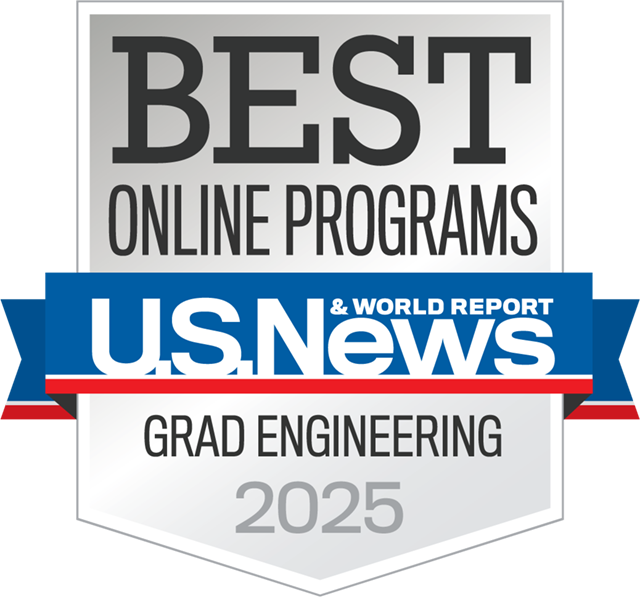100% Online
Complete your Penn State course work at your own pace and 100% online.
Application deadline
Credits and costs
Nationally Recognized

Gain Skills to Lead an Engineering Team
Apply business strategy and project management skills to solve engineering management problems.
Communicate project ideas, requirements, business analyses, findings, and justification for decisions.
Critically and creatively conceptualize, evaluate, and formulate engineering management challenges, as well as perform the analyses required for problem definition.
Blend technical expertise with essential business and management skills to fulfill industry's need for business-savvy engineering managers.
Online Courses That Build on Your Undergraduate Degree
Online Courses That Build on Your Undergraduate Degree
The 33-credit interdisciplinary curriculum provides business and management perspectives as well as problem-solving skills. The engineering management master's degree course work was designed to help you enhance your capability to manage major projects, business initiatives, policies, and other activities in the public and private sectors.
Core course topics include:
- Creativity and Problem-Solving
- Decision and Risk
- Engineering Management Science
- Engineering Management Strategy
- Financial Studies for Engineering
- Organizational Behavior
- Technical Project Management
You can earn up to three related graduate certificates along the way to your Master of Engineering Management. Students who plan to take the stackable credentials pathway to this degree should follow the course lists for each graduate certificate program. To earn each certificate, you must apply, gain acceptance to the program, and complete the required courses.
- Technical Management and Leadership Essentials (12 credits)
- Quality Management Across Product Lifecycle (9 credits)
- Quantitative Decision-Making for Engineering Managers (9 credits)
Students who are not pursuing stackable credentials can follow the full course list for the program.
Complete Your Engineering Degree in Two Years
This degree consists of 11 courses, which you will complete in continuous seven-week terms over a two-year period. Your course work is designed so that you can continue to work full-time while earning your master's degree. Maximum flexibility is maintained by the program in an effort to meet both the professional needs of individual students and academic quality standards.
Interact, Engage, Collaborate
Like our online systems and software engineering degree programs, the Master of Engineering Management program uses a cohort-based approach to learning and instruction. Over the years, we've found this approach creates a richer collaboration between instructors and students. Drawing on your own and the experience and knowledge of other students in your cohort, you will interact and exchange ideas as you move through your course work, allowing for greater integration of course material.
Add a Graduate Minor in Engineering Leadership and Innovation Management
Students pursuing the Master of Engineering Management degree can customize this program to earn a Graduate Minor in Engineering Leadership and Innovation Management (ELIM) without taking on additional credits. To enroll in the ELIM Minor, students will need to complete the Request to Add a Graduate Minor form prior to their second semester and submit it to the MEM program office.
The ELIM minor can provide professionals with knowledge and skills in the key aspects of engineering business. For more information on the graduate minor, review the ELIM Minor Course List or contact the ELIM program office.
Year 1, Semester 1
- 3credits
Mathematical models involving optimization, simulation and forecasting to provide quantitative solutions to engineering management problems; scheduling, distribution, inventory control.
- 3credits
Study interrelationships of twentieth century technological change and human values with emphasis on social and ethical aspects of technological progress.
Year 1, Semester 2
- 3credits
Individual and group behavior in organizations; motivation, performance and rewards, job satisfaction, decision processes, conflict resolution; job and organizational design.
- 3credits
Course is designed to develop the theoretical foundation that is needed to understand the principles of effective (and ineffective) approaches to negotiations.
- or:3credits
Descriptive statistics, hypothesis testing, power, estimation, confidence intervals, regression, one- and 2-way ANOVA, Chi-square tests, diagnostics.
Year 1, Semester 3
- 3credits
Theory and practice of linear programming applications, including determination of optimum mix of products, levels of staffing, blending, network analysis, and multi-period planning.
- Prerequisite
SYSEN 520 or instructor's permission
- 3credits
Economic feasibility of projects, systems and products. Project budgets, estimation, return on investment, supply and demand, and earned value management.
Year 2, Semester 4
- 3credits
Foundations of individual problem solving including creativity, cognitive style and level, problem solving processes and techniques, the paradox of structure.
- 3credits
Applications of sophisticated statistical tools for the continuous improvement of products and processes in the manufacturing and service industries.
Year 2, Semester 5
- 3credits
Examines the analysis of decisions under uncertainty within the context of engineering and technology. Evaluation methods; problem identification, modeling, and resolution; consequences/outcomes of the action taken; and risk analysis and quantification are covered to improve the decision-making process of individuals and groups in technical organizations.
- 3credits
Study of project management as it relates to engineering and high-technology projects and personnel. Techniques and methodologies to eliminate, mitigate, and manage the risks that threaten project success are covered.
Year 2, Semester 6
- 3credits
Project- and discussion-based capstone to the engineering management program.
- Note
This course spans the entire semester
Course Availability
If you're ready to see when your courses will be offered, visit our public LionPATH course search (opens in new window) to start planning ahead.
Advance Your Career in Engineering Fields

Advance Your Career in Engineering Fields
This degree can prepare you for an engineering management position with an engineering company or a more technically intensive role in a business environment. Plan now to lead, coordinate, and drive the direction of your career with an engineering management master’s degree earned online.
Job Titles Related to This Degree
The following roles are often held by people with this type of degree:
- Engineering Director
- Engineering Program Manager
- Process Engineering Manager
- Project Engineering Manager
Employment Outlook for Occupational Fields Related to This Degree
Estimates of employment growth and total employment are provided by the U.S. Bureau of Labor Statistics and are subject to change. While these occupations are often pursued by graduates with this degree, individual outcomes may vary depending on a variety of factors. Penn State World Campus cannot guarantee employment in a given occupation.
Architectural and Engineering Managers
Career Services to Set You Up for Success

From the day you're accepted as a student, you can access resources and tools provided by Penn State World Campus Career Services to further your career. These resources are beneficial whether you're searching for a job or advancing in an established career.
- Opportunities to connect with employers
- Career counselor/coach support
- Occupation and salary information
- Internships
- Graduate school resources
Ready to Learn More?
Get the resources you need to make informed decisions about your education. Request information on this program and other programs of interest by completing this form.
Ready to take the next step toward your Penn State master's degree?
Costs and Financial Aid
Costs and Financial Aid
Learn about this program's tuition, fees, scholarship opportunities, grants, payment options, and military benefits.
Costs and Financial Aid
Graduate Tuition
Graduate tuition is calculated based on the number of credits for which you register. Tuition is due shortly after each semester begins and rates are assessed every semester of enrollment.
2024–25 Academic Year Rates
| How many credits do you plan to take per semester? | Cost |
|---|---|
| 11 or fewer | $1,027 per credit |
| 12 or more | $12,325 per semester |
2025–26 Academic Year Rates
| How many credits do you plan to take per semester? | Cost |
|---|---|
| 11 or fewer | $1,037 per credit |
| 12 or more | $12,448 per semester |
Financial Aid and Military Benefits
Some students may qualify for financial aid. Take the time to research financial aid, scholarships, and payment options as you prepare to apply. Federal financial aid may only be used to pay for credits used to satisfy program requirements.
Military service members, veterans, and their spouses or dependents should explore these potential military education benefits and financial aid opportunities, as well.
Additional Cost of Attendance Details
To view the detailed list of cost of attendance elements:
- visit the Tuition Information site
- click the plus sign to expand the table
- select a semester from the World Campus row
Technical Requirements
Review the technical requirements for this program.
Note about additional hardware: It is a requirement for this online program that students have ready access to a document scanner that allows for the creation of PDF files, which will enable students to submit handwritten homework and exams in several of the mathematics-based courses.
Earn Stackable Credentials on the Way to Your Degree

Earn Stackable Credentials on the Way to Your Degree
Earn graduate certificates while you work toward your degree. It’s a great way to quickly gain new skills and add valuable credentials to your résumé — without any additional course work, course fees, or application fees.
Finish the following three certificate requirements and the 3-credit capstone course, and you will have completed the requirements to earn your Engineering Management master's degree. Please note you must apply and be accepted to each program on an individual basis, but you will not be charged application fees for any program beyond the first.
Complete All of These Certificates (30 credits)
This 9-credit online engineering certificate focuses on skills needed to excel at systems optimization, quality control management, and continuous improvement to help you prepare for a variety of careers related to product lifecycle management (PLM).
Learn more about the Graduate Certificate in Quality Management Across Product LifecycleThis 9-credit online engineering certificate focuses on engineering management analytics, economics analysis, decision models, and risk analysis to help you prepare for a variety of careers related to product or process development and management.
Learn more about the Graduate Certificate in Quantitative Decision-Making for Engineering ManagersThis 12-credit, online engineering certificate combines essential technology management and leadership skills and can help you prepare for a rewarding career, leading high-performing teams of engineers and technical personnel.
Learn more about the Graduate Certificate in Technical Management and Leadership EssentialsComplete the Capstone Course (3 credits)
After the certificate requirements have been met, you just need to complete the 3-credit capstone course to finish the master's.
Collaborative Learning to Enhance Your Education

Collaborative Learning to Enhance Your Education
This engineering management program employs a cohort-based approach to learning and instruction, which creates rich collaboration, interaction, integration of course material, and exchange of ideas between instructors and students.
This degree consists of 11 courses, which you will complete in continuous seven-week terms over a two-year period. Your course work is designed so that working professionals can continue to work full-time while earning their master's degree. Maximum flexibility is maintained by the online master’s degree program in an effort to meet both the professional and personal needs of individual students and academic quality standards.
Convenient Online Format
This program's convenient online format gives you the flexibility you need to study around your busy schedule. You can skip the lengthy commute without sacrificing the quality of your education and prepare yourself for more rewarding career opportunities without leaving your home.
A Trusted Leader in Online Education

Penn State has a history of more than 100 years of distance education, and World Campus has been a leader in online learning for more than two decades. Our online learning environment offers the same quality education that our students experience on campus.
Information for Military and Veterans

Are you a member of the military, a veteran, or a military spouse? Please visit our military website for additional information regarding financial aid, transfer credits, and application instructions.
How to Apply to Penn State

How to Apply to Penn State
Apply by November 1 to start January 12
Application Instructions
Deadlines and Important Dates
Complete your application and submit all required materials by the appropriate deadline. Your deadline will depend on the semester you plan to start your courses.
Spring Deadline
Apply by November 1 to start January 12Summer Deadline
Apply by April 1, 2026, to start May 18, 2026
Steps to Apply
For admission to the J. Jeffrey and Ann Marie Fox Graduate School, an applicant must hold either (1) a baccalaureate degree from a regionally accredited U.S. institution or (2) a tertiary (postsecondary) degree that is deemed comparable to a four-year bachelor's degree from a regionally accredited U.S. institution. This degree must be from an officially recognized degree-granting institution in the country in which it operates.
The program contains a number of courses requiring a solid background in engineering, mathematics, physics, or science so that participants are able to demonstrate the skills required for the management of complex engineering projects, products, and services within a typical engineering organization.
Applications are submitted electronically and include a nonrefundable application fee. You will need to upload the following items as part of your application:
Official transcripts from each institution attended, regardless of the number of credits or semesters completed. Transcripts not in English must be accompanied by a certified translation. If you are a Penn State alum, you do not need to request transcripts for credits earned at Penn State but must list Penn State as part of your academic history.
Test Scores — GRE/GMAT scores are not required and will not be reviewed.
English Proficiency — The language of instruction at Penn State is English. With some exceptions, international applicants must take and submit scores for the Test of English as a Foreign Language (TOEFL) or International English Language Testing System (IELTS). Minimum test scores and exceptions are found in the English Proficiency section on the Fox Graduate School's "Requirements for Graduate Admission" page. Visit the TOEFL website for testing information. Penn State's institutional code is 2660.
References (2) — You will need to initiate the process through the online application by entering the names, email addresses, and mailing addresses of two references. Upon submission of your application, an email will be sent to the reference requesting they complete a brief online recommendation regarding your commitment for success in an online program. Please inform all recommenders they must submit the form in order for your application to be complete.
Program-Specific Questions/Materials
Résumé — Upload a one- to two-page résumé highlighting your full-time employment and/or military experience to the online application.
Statement of Purpose — A one-page statement of intent outlining your personal career goals and reasons for wanting to enroll in the program. This statement should be specific and include information about short- and long-term goals and how enrolling in the program may help achieve them. The statement of intent also offers applicants the opportunity to demonstrate writing and communication skills, specify examples of leadership, and provide pertinent information that will assist the committee in selecting candidates who can benefit from and contribute to the engineering management program.
To begin the online application, you will need a Penn State account.
Create a New Penn State Account
If you have any problems during this process, contact an admissions counselor at [email protected].
Please note: Former Penn State students may not need to complete the admissions application or create a new Penn State account. Please visit our Returning Students page for instructions.
Stackable Credentials Application Fee Waiver
If you have been previously accepted to a program with stackable credentials, you will not be charged an additional application fee for any associated programs.
Associated programs in the engineering management stack:
Degree
- Master of Engineering Management
Certificates
- Graduate Certificate in Quality Management Across Product Lifecycle
- Graduate Certificate in Quantitative Decision-Making for Engineering Managers
- Graduate Certificate in Technical Management and Leadership Essentials
If you begin with a certificate and are interested in pursuing the Master of Engineering Management, work with your adviser while completing your first certificate to determine which program to apply to next.
Up to 15 credits earned in any of these certificate programs may be transferred to the master's degree in engineering management, subject to restrictions outlined in GCAC-309 Transfer Credit.
You can begin your online application at any time. Your progress within the online application system will be saved as you go, allowing you to return at any point as you gather additional information and required materials.
- Choose Enrollment Type: "Degree Admission"
- Choose "WORLD CAMPUS" as the campus
Checking Your Status
You can check the status of your application by using the same login information established for the online application form.6. Complete the application.
Admissions Help
If you have questions about the admissions process, contact an admissions counselor at [email protected].
Contact Us

Contact Us
Have questions or want more information? We're happy to talk.
To learn more about the Master of Engineering Management, please contact:
For general questions about the program:
Dr. Amanda Neill
[email protected]
For general questions about Penn State World Campus:
World Campus Admissions Counselors
Phone: 814-863-5386
[email protected]
Learn from the Best
Learn from the Best
The Master of Engineering Management is offered in partnership with the Penn State Great Valley School of Graduate Professional Studies, and the Penn State Harrisburg School of Science, Engineering, and Technology, and School of Business Administration.
Faculty
Mohamad Darayi
- DegreePh.D., Industrial and Systems Engineering, University of Oklahoma
- DegreeM.S., Industrial Engineering, Tarbiat Modares University
- DegreeB.S., Industrial Engineering, University of Tabriz
Dr. Mohamad Darayi, assistant professor of systems engineering, focuses his principal research and key publications on infrastructure network resilience and simulation modeling applications in health care, manufacturing, and supply chain management. He teaches courses in system simulation, risk analysis, network modeling, and data analytics.
Joanna F. DeFranco
- DegreePh.D., Computer and Information Science, New Jersey Institute of Technology
- DegreeM.S., Computer Engineering, Villanova University
- DegreeB.S., Electrical Engineering and Math, Penn State
Dr. Joanna F. DeFranco is an assistant professor of software engineering. She has worked as an electronics engineer for the Navy and as a software engineer at Motorola. Her research interests include software engineering teams, effective teamwork, Internet of Things, and software-intensive critical systems.
Nil Ergin
- DegreePh.D., Systems Engineering, Missouri University of Science and Technology
- DegreeM.S., Engineering Management, Missouri University of Science and Technology
- DegreeB.S., Environmental Engineering, Istanbul Technical University
Dr. Nil Ergin, associate professor of systems engineering, researches system of systems engineering, complex adaptive systems, model-based systems engineering, and multi-agent systems. Dr. Ergin is also affiliated with the Systems Engineering Research Center (SERC), a DoD–funded University Affiliated Research Center, where she works on collaborative research efforts among multiple universities. She is a member of IEEE and INCOSE.
Kathryn Jablokow
- DegreePh.D., Electrical Engineering, Ohio State University
- DegreeM.S., Electrical Engineering, Ohio State University
- DegreeB.S., Electrical Engineering, Ohio State University
Dr. Kathryn Jablokow is a professor of engineering design and mechanical engineering. She is an experienced researcher, with special expertise in design cognition, engineering creativity, and high-performance design teams. She is also an award-winning educator who has developed multiple engineering courses related to problem solving, creativity, and invention, including a massive open online course that has attracted more than 250,000 learners since 2013. She investigates the human side of engineering and the effects that individual cognitive differences have on the processes and products of design.
Ashkan Negahban
- DegreePh.D., Industrial and Systems Engineering, Auburn University
- DegreeM.E., Industrial and Systems Engineering, Auburn University
- DegreeB.S., Industrial and Systems Engineering, University of Tehran
Dr. Ashkan Negahban is an associate professor of engineering management. Prior to joining Penn State, he was an instructor at Auburn University, where he taught courses in simulation, probability theory, and statistics. His research interests include the application of different types of simulation (discrete event, agent-based, and Monte Carlo) in design and operation of complex systems. He has developed several e-learning modules that have received worldwide publicity and are used by faculty from leading institutions around the world.
Colin Neill
- DegreePh.D., Software and Systems Engineering, University of Wales Swansea
- DegreeM.Sc., Communications Systems, University of Wales Swansea
- DegreeB.Eng., Electrical Engineering, University of Wales Swansea
Dr. Colin Neill is a professor of software engineering and systems engineering. He teaches many courses in software and systems engineering and project management. He is the author of more than 80 articles on the development and evolution of complex software and systems and their management and governance. Dr. Neill is a senior member of the IEEE and a member of INCOSE, and he serves as associate editor-in-chief of Innovations in Systems and Software Engineering.
Robin G. Qiu
- DegreePh.D., Industrial Engineering, Penn State
- DegreePh.D., (Minor), Computer Science, Penn State
- DegreeM.S., Numerical Control, Beijing Institute of Technology, China
- DegreeB.S., Mechanical Engineering, Beijing Institute of Technology, China
Dr. Robin G. Qiu is a professor of information science at Penn State. He teaches courses on data analytics, information science, software engineering, and cyber security. Dr. Qiu's research includes smart service systems, IoT, big data, data/business analytics, information systems and integration, supply chain and industrial systems, and analytics. He served as the editor-in-chief of INFORMS Service Science. He is an associate editor of IEEE Transactions on Systems, Man, and Cybernetics and IEEE Transactions on Industrial Informatics, and has more than 160 publications.
Kailasam Satyamurthy
- DegreePh.D., Engineering Mechanics, Clemson University
- DegreeM.S., Civil Engineering, Clemson University
- DegreeMBA, Penn State
- DegreeB.S., Civil Engineering, University of Madras
Dr. Kailasam Satyamurthy, assistant professor of engineering, teaches decision and risk analysis, finance and economics for engineers, statistics, optimization, and continuous improvement courses. He held managerial positions at Vanguard and at GenCorp and conducted extensive research in the finite element modeling of nonlinear mechanical and thermal systems. He has vast experience in Six Sigma quality and continuous improvement, and has trained numerous professionals in manufacturing, transactional, and health care industries.
Doug Schumer
- DegreePh.D., Electrical Systems and Engineering, Rensselaer Polytechnic Institute
- DegreeM.S., Measurement and Control, Carnegie Mellon University
- DegreeB.S., Physics, Carnegie Mellon University
Dr. Doug Schumer is assistant professor of engineering design and faculty director of the REV-UP Center for Entrepreneurship. Following 20 years in industry leading medical device R&D, Dr. Schumer held the position of Rensselaer Polytechnic Institute's professor of practice in biomedical engineering and served as Georgia Tech's first director of design innovation and education. He is a member of the New York Academy of Sciences and the American Physical Society.
News

